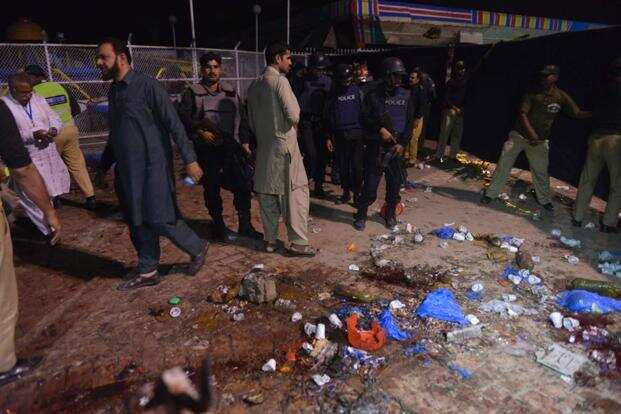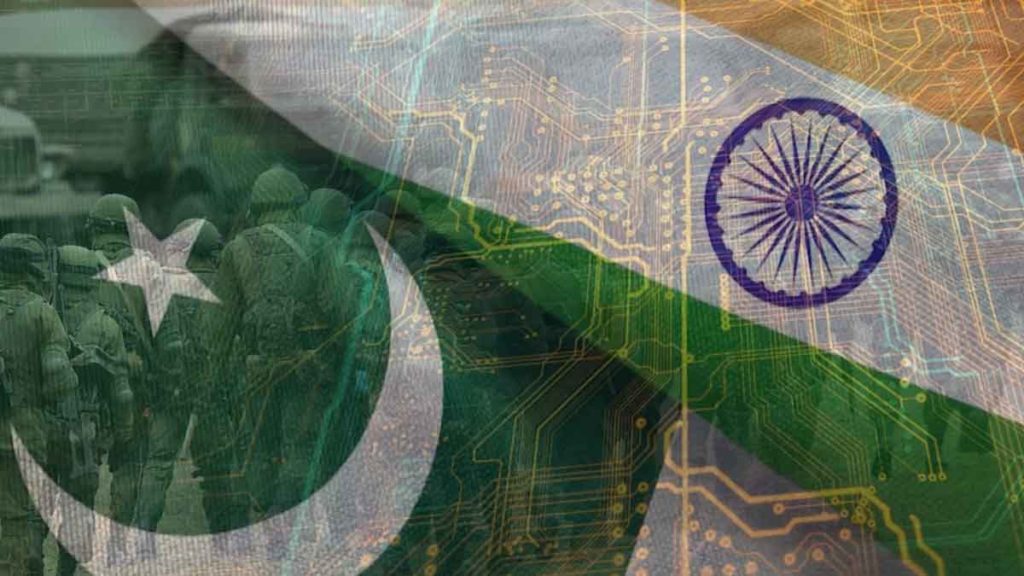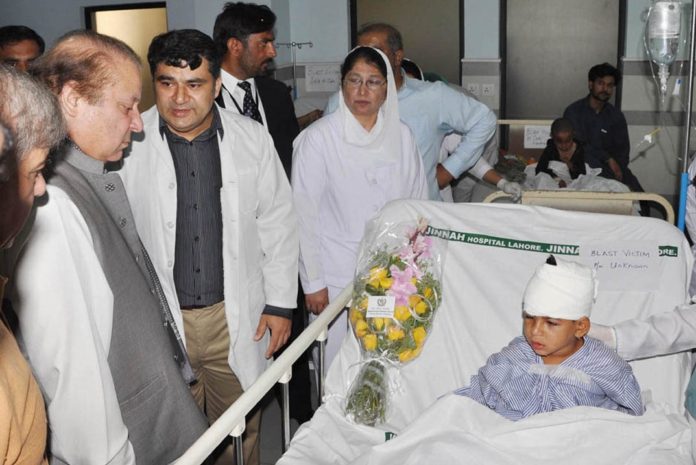The terrible suicidal attack at Gulshan-e-Iqbal Park in Lahore was an inhuman act which was condemned by all in and around the world. According to government figures more than 80 innocent people were killed and 350 seriously were injured, majority of them being children and women. The green (grass) turned red (blood) on this day of horrors. The whole nation mourned and prayed for the departed people and grief became the common factor that served to unite different faiths, sects, factions and communities. They all helped one another in order to reduce suffering and human misery.
There was widespread of anger, depression and helplessness. The arrival of our so-called democratic leaders on the spot only served to fuel anger in common people more who tried to beat them up. It was total chaos and even Prime Minister Nawaz Sharif’s televised speech could not win the hearts and support of those whose loves ones had died or the wounded. There was an element of rage which did not cool down despite the PM’s words/oratory.
Personnel of the Armed Forces were the first ones to reach at site and started rescue and search operations. It also secured and collected some crucial evidence and afterwards, processed it to the culprits.
The bashing by the western mass media had no reality because only 15-16 Christians were killed during this carnage, the rest were Muslim. It was not matter of ethnic rift, religious divide or societal discrimination because terrorism has no respect for humanity, peace or harmony. It was the blood of people scattered in a slaughter house. It was the cries of injured people who begged for some moments of life. It was tears of depressed people who lost everything during this horrendous act against humanity.
It was a wake call to all especially the sitting governments (Capital, Punjab) and this incident produced great dent in its ongoing pursuit against terrorism in the country, especially Punjab. It exposed policy flaws and lack of coordination among different government departments and functionaries. It also exposed the cosmetic arrangements of the provincial government towards the safety and security of its people. It produced shock and awe among the visiting Chinese delegates who had arrived to invest in different sectors of the Punjab.
A crucial meeting was held in GHQ under supervision of COAS, General Raheel Sharif about the emerging security threats in the country, especially in Punjab. Its response was spontaneous which rattled many in the corridors of power. A provincial wide search operation was launched by the Armed Forces and Rangers which proved very successful because it was launched as a surprise. Many wanted terrorists were caught and killed in the operation. The Provincial government considered this to be an attack on its orbit while the common people welcomed it and prayed for its grand success.
One of the basic recommendations of the National Security Policy is to launch country-wide search operations to crack down on all hatcheries of terror and hatred. Somehow, the promised search operation could not materialize in the Punjab, but the Lahore blast forced all sensible and responsible power elite to start the long awaited search operation there. Moreover, arrest of RAW spymaster Kulbhushan Yadav and his confessions of having country wide network of active agents and sleeper cells demanded a befitting response which was duly carried out by the Armed Forces of Pakistan.
The Lahore blast once again raised doubts about our national narrative and resolve against terrorism and extremism. It also upheld the strategic importance of the National Security Policy (NSP). We are passing through a” hybrid war” and the intelligence agencies of enemies are targeting us from everywhere. The NSP was envisaged to establish immediate measures and strategies to stem the tide of terrorism, weaken it and eventually defeat it. NSP had a mid-term policy initiative too that would reassess evolution and growth of extremism, radicalism, militancy and use of violence as a political weapon. The most important part of it was the establishment of the National Counter Terrorism Authority (NACTA) and the formation of a 500 strong rapid response team. It was a comprehensive counter-terrorism policy which dealt all the possible aspects of socio-economy, politics, administration, legal apparatus, ideological barriers and last but not the least, intelligence to make it flawless.

The NSP was a paradigm shift in the organization composition, functioning, sharing and coordination and capacity building of the intelligence network in the country. It stands for joint sharing of intelligence/ information for the better security and safety of the interests of the country. It had changed the chain of command. It was a multidimensional policy which would revolutionize the outfit of intelligence network in the country.
Following are the doable suggestions in order to implement NSP in its true spirit for achieving greater sense of security throughout the country.
i. The cabinet committee on national Security needs to play active role in the implementation and deliberations of the NSP.
ii. NCTA must work to formulate counterterrorism and counter extremism strategies and data collection may be assigned to any other associated agency. It must be a house of think tanks and strategists.
iii. Unity of command and discarding of too many layers of orientation in the NACTA needs to be rationalized.
iv. It would be better to patronize the federal agency like the IB or the ISI along the same lines as the MI5 of UK. The director general IB/MI or the director-general ISI must be given prominence because of his rich and diversified expertise in the fields of security and intelligence.
v. Punjab province has model of elite police units and also Dolphin Force which have been fighting against counterterrorism activities since 1990s. Therefore, establishment of a new counterterrorism force/unit in a province under the military brass is the need of the hour.
vi. De-politicising of the police in all provinces especially Karachi and Lahore, effective command and controls within the department and providing adequate resources to face security challenges must be the way forward to revolutionize the police institution.
vii. Community policing (being done in many parts of Europe) and conflict resolution policing models (Germany, France, UK) need to be adopted to address the trust-deficit between the citizens and the police.
viii. Formation of a special investigation group in the FIA may be handy for the government to fight against white-collar crimes, cybercrimes, computer forensics and analysis of the interrogation reports of arrested terrorists.
ix. Strict vigilance on terror financing needs to be implemented immediately. In this regard, money laundering laws of the UAE, US, EU and financial regulatory bodies like Federal Board of Revenue (FBR), the State Bank of Pakistan (SBP), Security and Exchange Commission of Pakistan (SECP), banks, financial development institutions including foreign exchange companies must be under regular supervision. Moreover, inflow of funds to militants, charity organizations and NGOs must be dealt with iron hands.
x. Role of interception, snooping, call tracing, Geo-Search must be formed at once. Most recently, the United Arab Emirates (UAE) established the biggest telephone observatory in the region which helps the interests of its national sovereignty and put a check on the in-out flow of the information. The government of Pakistan should seek the expertise of the UAE to establish this network in the country as soon as possible in the country.
xi. Civil armed forces like the frontier corps, rangers and frontier constabulary can augment the capacity of law enforcement agencies to deal with terrorism. The armed forces should be the last responder in the operational framework.
xii. Judicial system relating to terrorism prosecution is very weak due to many interrelated reasons of investigation, interrogation, legislation, infrastructure and the last but not the least, threats to witnesses, investigators, prosecutors, lawyers and judges are very common. Pakistan has one the lowest conviction rates in terror-related cases in the world which needs to be rectified by providing the professional competence of the state machinery and introduce sound witness and judge protection programmes (Italian, Mexico criminal judicial models).
xiii. Formation of “Military Courts” may be a noble idea for achieving open and transparent system of justice.
xiv. Formation of a national narrative is must to fight against looming threats of terrorism, extremism and sectarianism in the country. Experts of communications and strategists must be given their due role.
xv. Rationale use of national and private media would be useful to marginalize the narrative of the power of evil. Pentagon, KGB, Mossad and even RAW which have been using the media to its own strength in order to protect vested interest of their respective countries so why should not Pakistan?
xvi. Terrorists and banned militant organisations activities must be dealt with iron hands (Saudi Arabia counterterrorism strategies and laws for the formation of unified national narrative should be studied).
xvii. Many latest international watchdog agencies reports indicate that terrorism in Pakistan is getting younger, gender-oriented and urban. It is a dangerous sign which has multiplier effects. Rapid response teams should deal with attacks in crowded urban environments and track down fighters instead of full-fledge involvement of armed forces of Pakistan.
xviii. NSP reveals a mind boggling threat of possible use of chemical and biological substances as weapons by terrorists and non-state actors which must be dealt with irony hands.
xix. Establishment of consolidated data bank, pool of researchers and technical experts would bring difference in the overall functioning and effectiveness of the intelligence orbit.
xx. Promotion of culture of security is must to deal with the deadly incidents of terrorism throughout the country. In this regard, culture of security traits of Central Independent States (CIS) and Gulf cooperation council (GCC) must be thoroughly studies.
xxi. Hatcheries of militants can be influenced by empowering local governments. A federal system with trickle-down decision-making powers to lower levels of the society provinces, districts, tehsils and village councils gives a sense of responsibility to the local people who, in turn, own the government’s resolve to counter terrorism effectively. The Chinese system may be an ideal model.
xxii. Fueling societal faulty lines, the nontraditional threats, as a consequence, have also inspired insurgency of ethnic, political, economic and sectarian in nature, thus confronting the challenges of war by proxy, subversion and worsening law and order situation must also be thoroughly analyzed.
xxiii. NSP should be ideal combination of offence-defence. The US and EU nations counter-terror policy is based on deterrence and preemptive strikes, Pakistan is more reactive than proactive or even preemptive. Sri Lankan model of dialogue of offence-defence against liberation Tigers of Tamil Eelam (LTTE) should be studied in order to engage in serious talks with the TTP and Talban.
xxiv. Availability of economic prosperity would be anti-terror antidote in the days to come. Job generation would be an effective tool to bring back people from the clutches of the enemies of humanity. Gadoon Amazai Industrial Estate is an excellent example which brought a drastic change in the life of insurgents in that area. Saudi Arabia provided so many economic incentives and financial assistance to bring back many wandering souls from the clutches of ignorance, intolerance, and isolation to the mainstream of the society.
xxv. Rigorous overhauling in council of Islamic Ideology may be effective in order to counter the subversive activities and objectives of the militant groups. In this regard Saudi Arabia antiterrorism laws and strategies must be studied and followed in letters and spirits.
Concluding Remarks
The mantra of “Civil-Military” being on the same page needs to be rationalized. Sincere efforts and not just words/ oratory is the order of the day to cope with the menace of terrorism. There must be no more apologetic attitude towards India, Afghanistan and Iran if we seek to bring peace and harmony back to our soil.
Due to unwanted proxy wars Pakistan has too many sleeper cells (real threat) which must be checked and monitored on day to day basis. Moreover, Research and Analysis Wing (RAW) is rigorously engaged in many parts of the country for so many obvious reasons and covert missions. Right from its formation, it has been carrying out sabotage activities in the country with so many sleeper cells having strategic alliances with many localized hatcheries of terrorism, separatism, provincialism, ethnicity and sectarianism. It has been using all traditional means, modes and medium (human intelligence, infiltration, proxy war, propaganda techniques, so-called gathering of intellectuals, writers, poets, artists in a seminar, conference etc. hiring of journalists to write about and expose flaws of the sitting government’s policies on terrorism, financial intelligence, democracy, human right, justice and gender discrimination, etc.

Now, RAW is also using modern techniques to harm the very existence of Pakistan in shape of hybrid war, economic and financial intelligence through artificial intelligences, using social media (Facebook, Twitter, emails etc.).
Most recently the arrest of spymaster Kulbhushan Yadav is a great success but also a “wake-call” to all the intelligence agencies of Pakistan. Now it is high time to dismantle his entire network and be ready at all times to cope with all subvert activities of RAW in the country.
Intelligence is a complicated subject and profession which need a comprehensive policy against terrorism and national security. Immediate activation of “National Security Policy” is must to achieve the desired goals of peace and harmony in the country. It does not work in isolation. It is achieved with the combination of “sensible foreign policy”, better system of policing” institutionalization of “security culture”, better and permeant coordination and cooperation among all the intelligence agencies, appropriate justice system to investigate terrorists, rigorous “e-training”, refreshing courses relating to snooping, data security, save utility of all the communicative gadgetries and the last but not the least, better communication skills to grab the desired information and person in search.
Induction of qualified people in the fields of research and development, analysis of emerging socio-economic, geo-political and geo-strategic trends in and around the country on regular basis in all the intelligence agencies in the country would be a workable idea to cope with RAW in different fields of intelligence.
We are in the time of war for the last so many years, but unfortunately we could not develop a “concrete national security culture” among the people of Pakistan due to which, despite our efforts we are not achieving the desired levels of interceptions and arrests of sleeper cells. There is an urgent national need to develop a culture of security as commonly prevalent in most of the Central Asian Countries and other states of the world. Introduction of a series of literature in our education system may be an ideal choice to execute.
There must be regular surveillance to all the Indian Consulate Missions along with boundaries of Pakistan and within the soil of Afghanistan, especially Jalalabad, Herat, Kandahar, Mazar-e-Sharif and Kunduz. Moreover, since a close liaison between India and Iran has been under consideration and has now established strict surveillance of Indian Consulate Mission in Zahedan, Iran must be priority of all the intelligence agencies of the country. The Iranian city Chahbahar needs to be focused upon mostly because of RAW network.
A clear-cut policy and law about economic terrorism financing and smuggling from the porous sides along with the boundaries of Quetta and Peshawar need to be overhauled. There is now an urgent need to improve our border security system too.
Complete online record of all the Islamic Schools (Madrasa) must be compulsory because most of the Islamic Schools have become hatcheries of terrorism and extremism in the country and especially on the dawn of new international brand of terrorism i.e. ISIS it is must for the security of the country. Mushroom growth of women Islamic Quran Centers in many metropolitan cities have become easy prey for ISIS which needs to be rectified and monitored properly on regular basis.
There is an urgent need to enhance our capacity building in our intelligence system and orbit. It requires a fresh and futuristic outlook to our system in order to easily cope with all harmful activities of RAW and other intelligence agencies in the country.
Intelligence profession has been revolutionized and the last innovation is “Mind Control Sciences” which needs to be studied and followed in order to compete with secretive mindsets and operations of RAW and its local supporters in the country.
Artificial intelligence is must because it is trans-humanistic but importance of human intelligence is always there to institutionalize. Human intelligence is our core strength which needs to be further motivated and patronized in all the intelligence agencies of the country.




